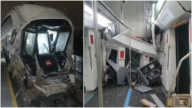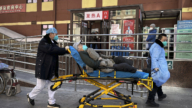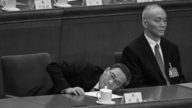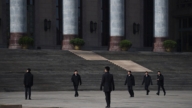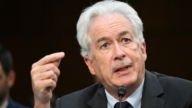【新唐人2013年06月06日訊】中共喉舌《新華網》報導,中共中紀委辦公室已經派出10個中央巡視組,進駐有關地區和單位,展開為期兩個月左右的所謂新一輪巡視工作。然而,對於中央巡視組成員的身份和巡視組的權力,在巡視過程中是否能起到實效作用?引起了外界的爭議。
今年中共中央巡視工作動員暨培訓會議提出,今年上半年,中央巡視組將對內蒙古、江西、湖北、重慶、貴州、水利部、中國儲備糧管理總公司、中國進出口銀行、中國出版集團、中國人民大學開展巡視。
然而,香港《信報》發表評論文章說,巡視組雖然權力很大,可以聽取匯報,個別談話,實地調研,列席會議,查閱記錄等等,但最為尷尬的是,他們沒有可以先斬後奏的尚方寶劍。
文章指出,中央巡視組存在三大尷尬。尷尬之一:官員的身份。由於中央巡視組是由中紀委派出,組長都是些沒有辦理離職退休手續的省部級官員;尷尬之二,巡視組對誰負責的問題。雖然巡視組享有中央賦予的權力,但沒有辦案的職能;而第三大尷尬是,對於中央巡視組的宣傳,既要宣傳但又不能很詳細。
北京時政觀察人士華頗表示,派中央巡視組這個方法並不新鮮,因為在中國古代就有御史巡按制度。中共現在這樣做,只能說是新一屆領導人採用巡視組這樣一種方法,來達到收權和示威的目地。
北京時政觀察人士華頗:「習上臺以後他要幹成一些事情就要建立一個非常強勢的中央,就是要加強中央極權,這樣一來就要收地方支權,讓地方服從中央,聽中央的話。」
大陸民主人士恩廣:「這只是習近平上臺的一個策略,那就是:還要鞏固和籠絡他下面的官員。」
據報導,這次巡視組「巡視」的對像和範圍,主要是按照中共中紀委書記王岐山指出的會議要求,從「貪腐」、「作風」、「政治紀律」、「用人」方面查找「省部級官員」的違法違紀問題。
而巡視組的組長成員,卻是從已經離開一線工作崗位,但還沒有年滿70歲的省部級(正職)官員中選任。巡視組組長被任命後,工作到年滿70歲才正式辦理退休。
華頗認為,安排退下來的那些官員去查案,當局的想法恐怕太天真。
華頗:「在中國人際關係很重要,他雖然退下來了,但是還會和地方有一些千絲萬縷的關係,因為還有一些朋友的關係,還有一些是老部下、老同事、老熟人的關係,甚至還有一些親戚關係,這種關係是錯綜複雜,水很深。」
恩廣: 「他們的效果會很有限,那官員,中國不管是監督部門,還是調查部門,還是調研部門下去調研,都不外乎是走走過場而已。他們沒有一個健全的社會監督的機制。」
5月27號,中共中央第一巡視組進駐「中國儲備糧管理總公司」開始巡視,結果,5月31號,「中儲糧」黑龍江林甸直屬糧庫就發生大火,媒體報導說,損失近億元人民幣。輿論認為,大火非常蹊蹺。甚至有民眾猜測,是糧食貪官縱火,以此來毀滅虧空的罪證。
採訪編輯/唐睿 後製/蕭宇
Chinese Communist Party Central Inspection Teams Effectiveness Questioned
The official Xinhua News Agency website reported that
the Chinese Communist Party(CCP) authorities
have sent out ten central inspection teams.
These working groups have been stationed in some regions
and enterprises, to undertake two-months of work inspection.
However, the teams’authority, the team leaders’status,
as well as their effectiveness have met with controversy.
In a motivational training meeting, it was announced that
the central inspection teams will carry out nationwide
inspections during the first half of this year.
Their scope covers Inner Mongolia,
Jiangxi, Hubei, Chongqing and Guizhou.
This includes the Ministry of Water Resources,
China Grain Reserves Corporation (Sinograin),
the Export-Import Bank of China,
China Publishing Group Corporation,
and Renmin University of China.
According to the Hong Kong Economic Journal,
these task groups have been given a lot of power.
However, it is thought they lack the power that enables
them to act without needing to ask permission to do so.
Critics highlight three difficult issues
that face these central inspection teams.
Firstly, the status of the team leaders.
The teams were sent by the CCP Central
Discipline Inspection Commission.
The team leaders are all provincial-level officials,
who have stepped down from leadership posts.
This is largely due to old age, whilst
they haven’t yet to apply for retirement.
Secondly, it is brought into question
whom the task groups report to?
The workgroups are empowered to make inspectional tours,
but aren’t empowered with the role of handling any cases.
Thirdly, the publicity of the central
inspection teams is questioned.
Hua Po, political observer in Beijing, commented.
The central authorities dispatching
inspection teams is not new, he says.
In ancient China, there existed a
system of imperial itinerant inspectors.
Hua Po views it as the new CCP leaders’approach to
centralize power, displaying the central authorities’strength.
Hua Po:"Xi Jinping has to set up a robust
central power to back him within his role.
That is, to strengthen the centralized totalitarian regime
by centralizing political power from local authorities."
En Guang, China pro-democracy activist:"This
is a strategy that Xi Jinping has implemented.
That is, to cement ties with, and
to rope in, the subordinate officials."
Reportedly, the inspection teams will target provincial-level
officials who have violated laws, and the CCP disciplines.
The inspection scope will cover the following areas:
corruption, misconduct, Party discipline,
and staff promotions and demotions.
Team leaders are all provincial-level CCP officials who are
nearing 70 years old, and have otherwise stopped working.
Once appointed, the inspection team leaders,
will work until the age of 70, and then retire.
Hua Po says it is a naive idea that the CCP authorities
are using these retired officials to investigate cases.
Hua Po:"In China, personal connections are very important.
He has stepped down from his leading post,
but he is still active in his social network.
He has some friends, old colleagues,
old acquaintances, and some relatives.
These connections are complex and mixed."
En Guang: “Their work can only produce limited results.
Chinese officials, no matter whether they
are in charge of oversight, investigation or
research, are all going through the ‘motions’.
China lacks an effective watchdog mechanism."
On May 27, the No. 1 Central Inspection
Team began their work in Sinograin.
On May 31, a fire broke out in a Sinograin grain
depot located in Lindian, Heilongjiang Province.
There was a financial loss of nearly 100 million yuan.
The public questioned the occurrence of this fire.
Some speculated that it the fire was started
by officials, to destroy evidence of deficits.


